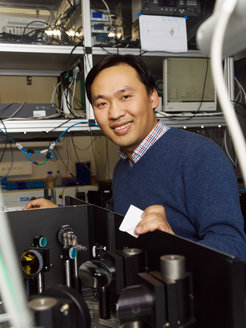Dr. Hai Wang

Hai Wang studied materials science at Zhejiang University and obtained his degree in 2009. Between 2009 and 2011, he finished a joint master program in nanoscience at University of Leuven (2009-2010) in Belgium and Delft University of Technology in the Netherlands (2010-2011), supported by the Erasmus Mundus fellowship. From 2012, Hai Wang started his PhD at Max Planck institute for polymer research (MPI-P) in Mainz with the support of a fellowship from MAINZ (graduate school of excellence, materials science in Mainz). In his PhD, Hai worked with Enrique Cánovas and Mischa Bonn on investigating ultrafast charge transfer process at quantum dot and oxide interfaces, and graduated with Summa Cum Laude (with highest honors) in February of 2016. After that, he spent ~ 1.5 year in the group of Mathias Kläui at University of Mainz as a postdoc, where he focused on studying the ultrafast carrier dynamics in graphene and graphene nanoribbons. On 1 August, 2017, Hai started his group “Nano- optoelectronic materials” in the Molecular Spectroscopy department at MPI-P.
Main Research Interests
Our research interests lie in optical and electrical characterization of low dimensional optoelectronic materials and their integration into optoelectronic devices. The material systems which we are interested, include but are not limited to: two dimensional (2D) monolayer semimetals (e.g. graphene) and semiconductors, 1D atomically precise graphene nanoribbons, and 0D semiconducting colloidal quantum dots and their hybridized structures and interfaces. Employing time-resolved, ultrafast spectroscopies (THz spectroscopy, transient absorption etc.), we aim to understand fundamental processes of photogenerated carriers in optoelectronic materials and interfaces upon illumination, e.g. carrier generation, hot carrier cooling, exciton formation, charge separation and charge transport at nanoscale. Eventually, we wish to correlate these ultrafast carrier dynamics with energy conversion efficiency in the final devices based on materials of interest.
